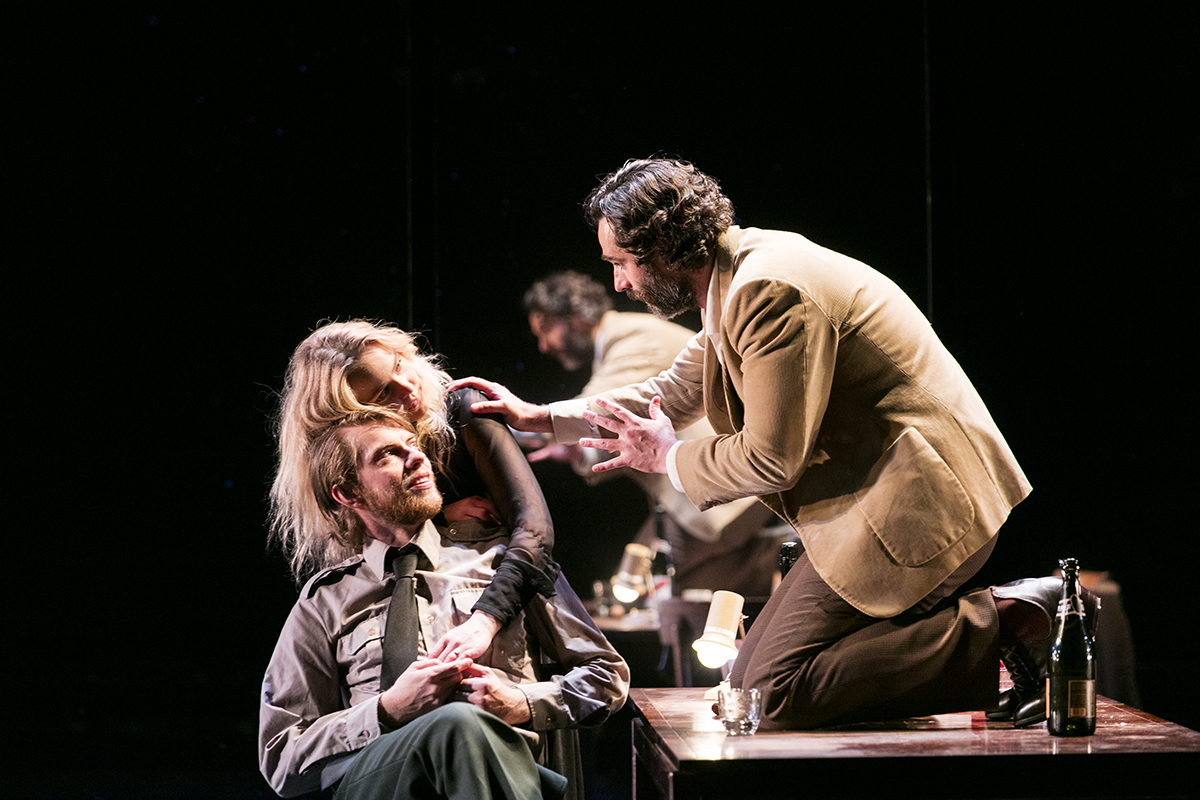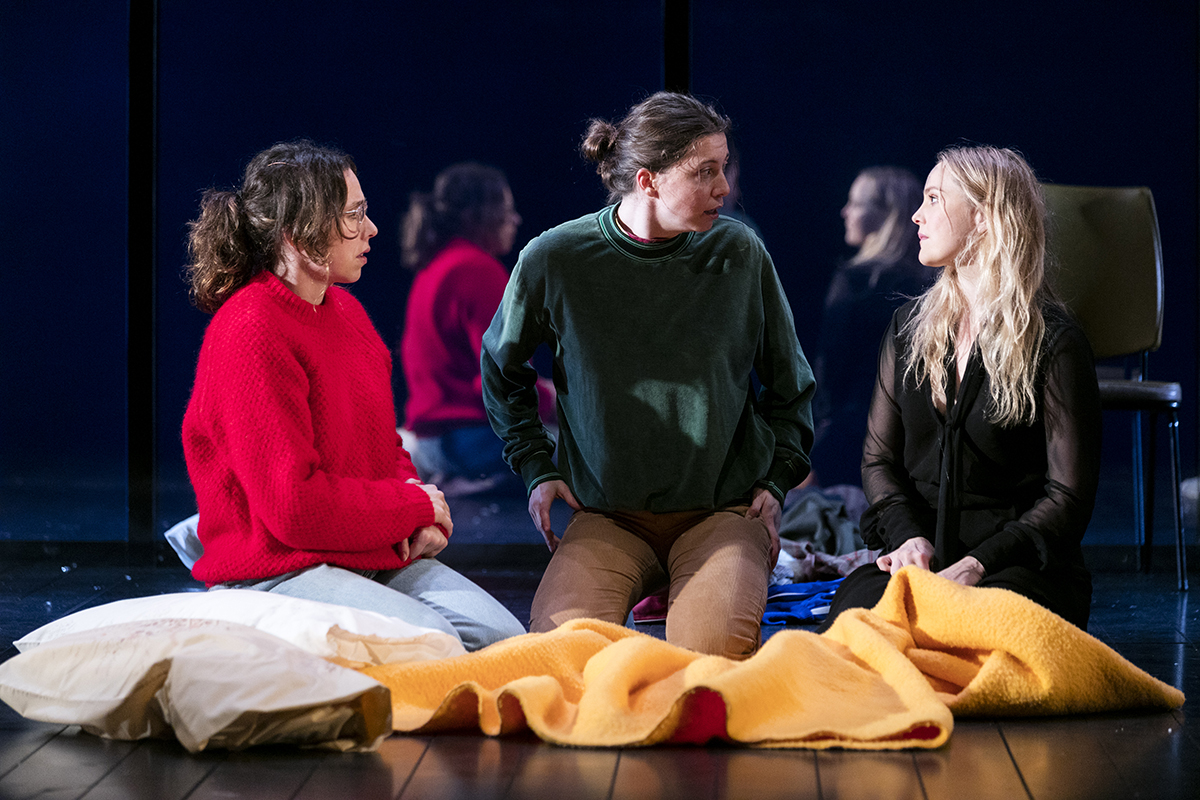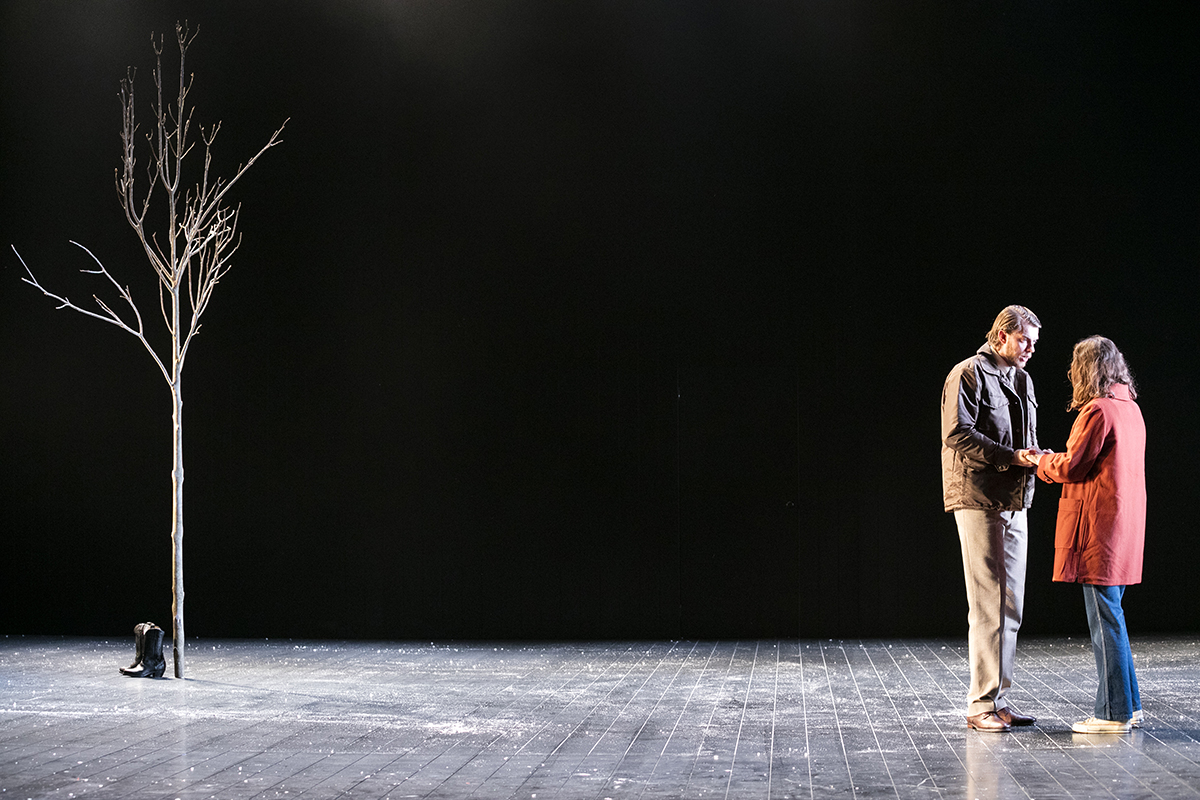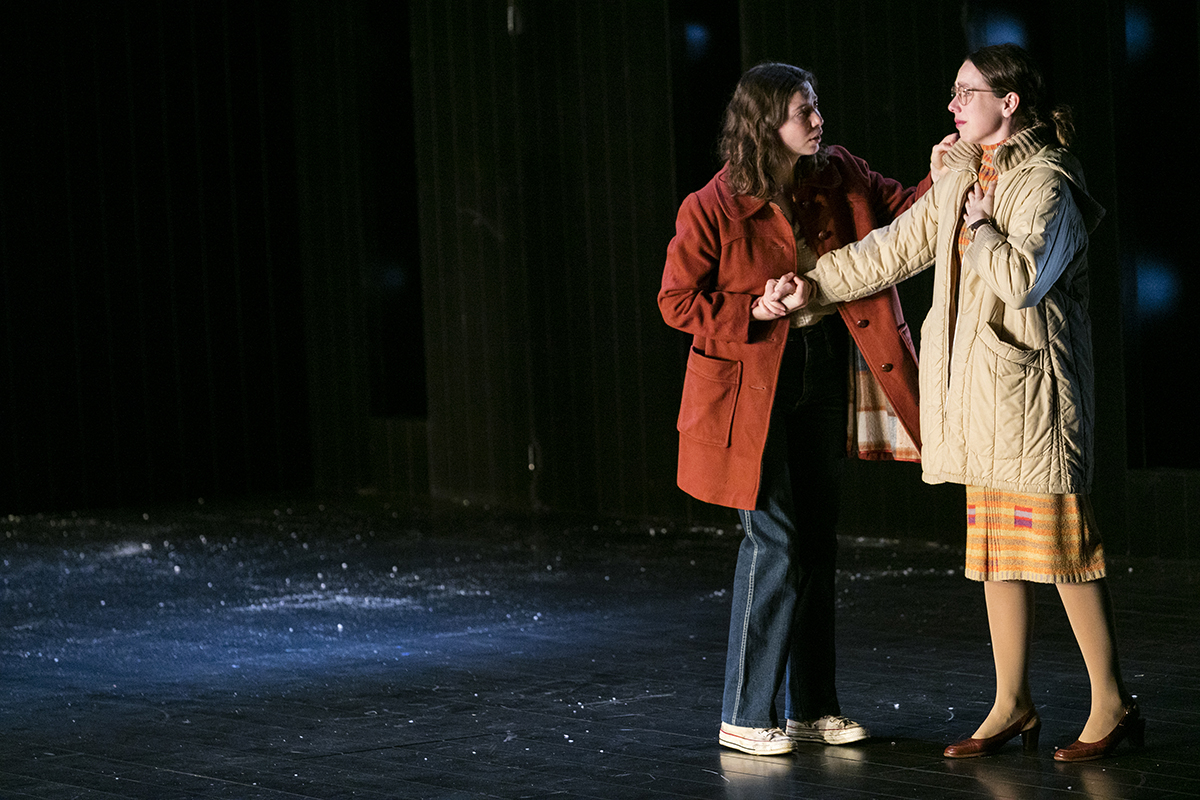
STC’s Three Sisters: seeing double
I tried hard to forget Chekov’s Three Sisters and see Andrew Upton’s adaptation, directed by Kip Williams, on its own terms. It’s not easy, not unlike seeing double; the better you know the play, the more giddying the experience when seeing a production that throws an image of the audience back at itself and mirror doubles its players.
Olga (Alison Bell) is filling balloons for a party on the first anniversary of her father’s death. Life, death, inflation, deflation, hope and despair. From simple beginnings, Williams and Upton vigorously ramp up tensions and mood swings. Desires are stalled, blocked and defeated and resilience severely tested as the limited culture of a regional town erodes the sisters’ hopes, especially the desire of the youngest, Irina (Miranda Daughtry), to return to their beloved Moscow. Words are not enough: the third sister Masha (Eryn Jean Norvill), is verbally and physically volatile, so too her speechmaking lover Colonel Vershinin (Mark Leonard Winter).
Passions are expressed with physical heft, conversations overlap, partying borders on cacophonous, “Shut up!” is wielded like an axe. In loose configurations, characters stream casually about the house (simple table and chairs before a huge glass wall, at once mirror and window). Complications ensue; the brother Andrei’s (Brandon McClelland) vulgar wife Natasha (Nikki Shiels) initiates her takeover of the household and an affair commences. Years (number not specified) pass, the world narrows, after a fire, to a small room claustrophobic with despair; more years on, it enlarges to a wide outdoor space with a single tree with barely a leaf. Long gone is the relatively convivial sense of community: the open stage is a closed space of reckoning, tortured separation and a limited future for the sisters. This overall trajectory and the performances in particular deeply engaged me, whatever misgivings I had about the adaptation and design — a disjunct I’m compelled to worry at.

Alison Bell, Miranda Daughtry, Eryn Jean Norvill, Three Sisters, 2017, Sydney Theatre Company, photo Brett Boardman
Upton’s Three Sisters transmutes the playwright’s original, albeit constantly recognisable, into a new play, grimmer, fevered and largely stripped of the gentility of its end of the 19th century regional middle class milieu. Masha demands of her lover Vershinin, “I want to see you while you fuck me” and impresses on her romantically fixated sister Irina the joys of sexual penetration. Old folk songs, Pushkin and Tolstoy, who unite the lovers, are replaced by Bob Dylan, whose songs, according to Upton in an interview in the program, tally with director Kip Williams’ desire to set the play in the 1970s, a period of intense sexual, social and political instability in the West and gradually felt in the Soviet Union. The songs are an awkward fit and not all the most recognisable of Dylan’s output.
Far more challenging is Upton’s excision of the sisters’ final words, Olga’s above all, in which, shortly after the death of Irina’s fiancé in a duel, the sisters sadly rise to the challenge of their limited prospects. It’s an authorial decision that denies director and actors to likewise rise to a challenge — how to balance the sisters’ stoic determination with the sheer weight of pain so recently inflicted on them. Presumably Upton felt the original insufficiently hard-nosed for the 1970s and our own times. In doing so he ignored the rigour of the play’s emotional ebb and flow in which a pattern of crisis, acceptance and resilience plays a key role in the overall arc of the work.
Although the Baron Tusenbach (Harry Greenwood) is killed in a duel with the jealous Solyony (Rahel Romahn), Irina had accepted him as her husband, taking to heart Olga’s counsel, “Love is not an idea” and abandoning her romantic idealism — “I let go.” She can now face life more openly. Miranda Daughtry’s performance is an exquisitely delineated journey from optimism to bitter despair and numb acceptance. She is adroit at catching sudden mood swings: from the child-like joy of mocking her brother (who has mortgaged their home without consulting the sisters) with a pillow stuffed up her jumper to seconds later — hating work, lonely — uttering fiercely, “I want to die!”

Harry Greenwood, Miranda Daughtry, Three Sisters, Sydney Theatre Company, 2017, photo Brett Boardman
The production’s most affecting scene is played out between Irina and the Baron (played by Greenwood without bluster as an awkward, sensitive soul, judicious to a fault) as they hesitantly reach an agreement about marrying without guarantee of anything more than affection; it’s in stark counterpoint with the rough separation of Masha and Vershinin, but both exemplify the taut emotional push and pull of the production at its best.
Masha proves to be a surprising realist, admitting her love for Vershinin to her sisters, but with a caveat: “I always knew the crash was coming.” Her determination to live in the moment is thrillingly realised in Norvill’s hyperactive portrayal. It’s hard to imagine that this Masha will ever settle, regardless of the hopes of her accommodatingly optimistic husband Kulygin (Chris Ryan’s fine performance, part witless joker, part empathic observer, dextrously sidesteps pathos). The sexual attraction between Masha and Vershinin is overt, manifesting as a dance-like interaction of people with excess energy resulting in a risky sexual encounter replete with an irrepressible erection and, at the play’s end, a moving departure with Masha clinging desperately to her lover, he stumbling backwards, until Olga intervenes, Kulygin watching on. For Olga, resilience and wisdom are all she has in a town that, as Masha says, can never acknowledge or nurture her brilliance. She is bound to accept an unwanted promotion to headmistress, if with Irina as a fellow teacher. The surface calm and reasonableness of Alison Bell’s Olga barely belie a tremulous psyche and deep disappointment.
Vershinin too is on a path to acceptance of his circumstances. Initially this is expressed as fatalism induced by the burden of a suicidal wife, two small children and the sorry state of the world. But the colonel is also an optimist; whenever he despairs or the conversation slumps he swings into vigorous speechmaking, taking centrestage or standing on a table, speculating on the emergence of a benign society some 200 to 300 years hence (a position Olga takes at the end of the original play). It’s a compensatory hopefulness. When the town is badly damaged by fire, Vershinin’s despair is tempered by his pride in his soldiers’ firefighting and his growing sense of familial responsibility. Mark Leonard Winter fully embodies the drive of a man keeping anxiety at bay — “If I don’t talk I’ll die”. Masha, however, knows that words can be “precious life talked into a stew of blather.”
The sisters, Vershinin, the Baron and Kulygin, in one way or another, adjust as best they can to the cards that personality, class, culture, the state and fate have dealt them, opportunistically in the case of sister-in-law Natasha — pure pragmatist, happy adulteress and unashamed of her vulgarity. Nikki Shiels plays her with escalating force, climaxing in her unrelentingly cruel treatment of the elderly maid Anfisa, affectingly realised by Melita Jurisic. The other characters are beyond change. Already failures, Solony (clearly dangerous from the outset in Rahel Romahn’s performance) and the doctor Chebutikin (Anthony Brandon Wong in an intense, low-key performance) are absolutists, utterly dismissive of others’ concerns; the former is responsible for the Baron’s death, the latter for not preventing it. Upton elaborates on Chebutikin’s cynicism (“Do we exist?”), amplifying the doctor’s sense of professional helplessness with disturbing images: guts described as “a bag of cats.” Andrei is also beyond help. Revealing his suffering, he crawls into Olga’s bed to be comforted, but is not saved from Natasha or himself. All the gradations of hope, despair, denial and acceptance are finely wrought across the ensemble.

Miranda Daughtry, Alison Bell, Three Sisters, Sydney Theatre Company, 2017, photo brett Boardman
Performance in Three Sisters is disadvantaged by the production’s framing. For a director who is usually rigorous with design and screens, the deployment of the wall/mirror seemed limited, providing brief forays outside the house and, for whatever reason, reflecting the audience and doubling the actors, yielding a complex space and reducing focus. Perhaps it aimed to provide a sense of intangibility on the one hand and denser communality on the other. As for implicating the audience, our reflection would need to be put to further use to make a point, but it was abandoned in the second half, as if we no longer counted.
I’ve already mentioned the problematic use of Dylan songs, to which should be added the bridging music of the moment, not of the 70s, provided by The Sweats especially when juxtaposed with a Soviet Union army choir heard within scenes. As with the design, this was indicative of a failure to run with the 70s concept, or whenever, say up to the fall of the Berlin Wall. The uniforms worn by Vershinin and the Baron appeared to be Soviet, a newspaper read by the doctor possibly Russian. The samovar given to Irina in the original is replaced with a doll (hardly of the same order). There is little in this Three Sisters that generates a palpable sense of place or time as the years go by uncounted. The 60s and 70s in the USSR saw the emergence of significant dissidence, for example Shostakovitch’s Symphony 13, Babi Yar, a protest against anti-semitism, and the hugely popular and publicly performed poetry of Yevtushenko (whose lines appear in part in Babi Yar). Using these or like materials might have made better sense of an era. The previous Upton adaptation for the STC, The Present, from Chekov’s Ivanov, conveyed at least an apt sense of the brash, corrupt nouveau riche that emerged from the collapse of the USSR. Without sufficient texturing this adaptation fails to evoke an era, let alone correlate relationships between the 1890s, 1970s and now. As it stands, Three Sisters offers moving performances from actors who have embraced the overt emotional range and trajectory of the adaptation and direction, but within a framework that is conceptually underdeveloped.
–
Sydney Theatre Company, Three Sisters, writer Anton Chekhov, adaptation Andrew Upton, director Kip Williams. designer Alice Babidge, lighting designer Nick Schlieper, composer The Sweats, sound designer Nate Edmonson; Drama Theatre, Sydney Opera House, 20 Nov-18 Dec
Top image credit: Three Sisters, Sydney Theatre Company, photo Brett Boardman






